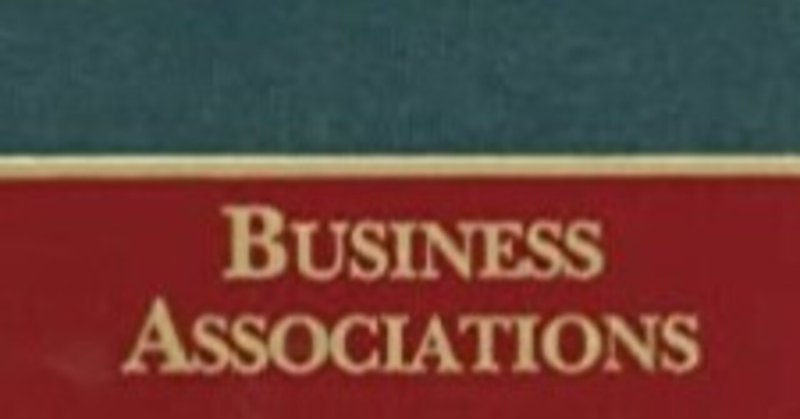
Duty of CareとDuty of Loyaltyについて
Duty of Loyaltyにはビジネスジャッジメントルール(BJR)の適用がない、という嘘をついている人をTwitterで見かけて、結構気になったので、いまさらながら、Duty of CareとDuty of Loyaltyについてまとめてみました。
結論から言えば、DOL違反を問われている場合において、144(a)(1)の状況があり、かつ、支配者でないのであれば、Duty of LoyaltyBJRが適用されます(原告に主張責任)。ですので、Duty of Loyaltyにはビジネスジャッジメントルール(BJR)の適用がない、というのは嘘です。
Duty of Care
Duty of Careについては、例えばALI § 4.01(a))においては以下の通り定められています。
ALI § 4.01(a)) A director or officer has a duty to the corporation to perform the director’s or officer’s functions: 注意義務(ALI§4.01(a))取締役又は役員は、会社に対して、取締役又は役員の職務を以下の通り遂行する義務がある:
(i) In good faith, 誠実に
(ii) In a manner that he or she reasonably believes to be in the best interests of the corporation, and 当会社の最善の利益になると合理的に信じる方法で、かつ
(iii) With the care that an ordinarily prudent person would reasonably be expected to exercise in a like position and under similar circumstances. 通常の賢明な人が、同様な立場・同様の状況下において行使することが合理的に期待されるような注意を払う。
→SHの訴訟には、複数の被告である取締役が含まれますが、彼らはそれぞれ異なる役割を果たし、異なる義務に違反していた可能性があり、取締役ごとの検討が求められます。
もっとも、基本的に取締役に「過失」「重過失」があるという程度では、原告はDoC義務違反の訴訟を勝つことはできません。
まず、DoCの定義自体では、取締役に過失があればDOCに違反するということになりますが、これはBJRにより免責される可能性があります。
また、重過失であれば、Van Gorkom事件判決に示されるように、重過失はBJRでは保護されないということになりますが、DGCL102(b)7の規定により免責することができます。ただし、金銭賠償ではなく差止請求であればDGCL102(b)7不適用。
そのため、取締役の行為が悪意、意図的な違法行為、または故意の法律違反と言えるほどひどい場合は、責任を問われる可能性がある、ということになります。
この点、Disney判決を参照すれば、consciously and intentionally disregarded their responsibilities and exhibited knowing and deliberate indifferenceは悪意であるということで、Duty of Careの請求として、BJRにも102b7にも阻まれることなく、損害賠償請求をなしうる(MTDに引っかからない)ということになります。(なお衡平裁判所段階では通常の過失程度であると言うことを前提にBJRを適用してDismissと判断している)
典型的なBJRの規定は、ALI § 4.01(c)が参考になります。
Business Judgment Rule (ALI § 4.01(c)): 経営判断原則(ALI§4.01(c))
A director or officer who makes a business judgment in good faith fulfills the duty under this section if the director or officer: 誠実に業務判断を行う取締役または役員は、以下の場合に本項の義務を果たしたものとする:
(a) Is not interested in the subject of the business judgment (financially) 経営判断の対象に(金銭的に)利害関係がない
(b) Is informed with respect to the subject of the business judgment to the extent that the director or officer reasonably believes is appropriate under the circumstances; and 経営判断の対象について、その状況下で適切であると取締役または役員が合理的に信じる範囲で情報を得ている
(c) Rationally believes that the business judgment is in the best interest of the corporation. その経営判断が会社の最善の利益になると合理的に信じていること
BJRを判断した裁判例としてAMEX事件がありますが、こちらでは、以下の通り上記(a)から(c)の全てを判断しています。
Directors were not financially interested – every action taken by the BOD has some impact on earnings and may therefore affect the compensation of those board members whose compensation is tied to profits, and there is no evidence that even if the 4 officers were maybe financially incentivized by this, that they could have swayed the 16 other directors. 取締役会が行うすべての行為は、利益に何らかの影響を与え、したがって、報酬が利益に結びついている取締役の報酬に影響を与える可能性がある。仮に4人の役員がこのことによって金銭的なインセンティブを得たとしても、他の16人の取締役を動かすことができたという証拠はない
Directors were reasonably informed – knew about the beneficial tax consequences if they had decided to sell the shares (court: not a situation where they overlooked facts called to their attention – gave them consideration.) 取締役は合理的に情報を得ていた-株式売却を決定した場合の有益な税務上の結果を知っていた(裁判所:注意を喚起された事実を見過ごした状況ではなく、考慮していたとのこと)
Directors could rationally believe that this decision was in the best interest of the company (rationally is a low standard) – better to not report the loss and not get the tax benefit, then to get the tax benefit and have to report the loss 取締役は、この決定が会社の利益になると合理的に信じることができた(合理的というのは低い基準である) - 損失を報告せずにタックスベネフィットを得られない方が、タックスベネフィットを得て損失を報告しなければならないよりはましだということ
BJRの注意点としては、積極的に何かをしたわけではなく、単なる怠慢であった場合には、経営判断が行われていないため、そもそもBJR適用の前提を欠くという点があります(例:Francis v. United Jersey Bank )。
ケアマーク義務
Seminal case for duty to monitor: caremark claims 監視義務に関する重要な判例として、以下の通りの、ケアマーククレームがあります。
Standard for caremark claims: only sustained or systematic failure of the board to exercise oversight will establish lack of good faith that’s a necessary condition to liability Caremarkクレームの基準:取締役会による監視の実施の持続的または組織的な失敗のみが、責任の必要条件である誠実さの欠如を立証する
これは、満たすべき基準はかなり厳しいですが(取締役のハードルは低い)、アリス・チェンバーズよりも厳しいため、より積極的なシステムが必要となるということになります(ただ座っていて何もしないわけにはいかない)Pretty tough standard to meet (low bar for directors) but tougher than allis-chambers cause requires more proactive system (can’t just sit back and do nothing)
Duty of Loyalty
Duty of Loyaltyは、基本的に、財務的利害関係がある場合のクレームです。
伝統的には、①Self dealing 自己取引、②Corporate opportunity 企業の機会奪取に関して議論されてきましたが、Duty of Loyalty違反となるのは上記場合に限定されるものではありません。
現在では、受託者の忠実義務違反には2つの要素があります。Breach of fiduciary duty of loyalty now has 2 components
(a) Self-interested behavior利己的な行動 (self-dealing, taking oppotunity)
(b) Super gross negligence / bad faith / abandonment of office 超重度の過失/悪意/職責放棄
があります。
参考までに、Disney事件では、取締役には財務的利害関係がなかったのでDuty of Loyaltyの申し立てはありませんでした(no allegations of a violation of the Duty of Loyalty – directors had no financial interest)
もっとも、DOLにもセーフハーバーがあります。自己取引にしか適用されないものではありますが、まず、DGCL144があります。
DGCL § 144 - interested directors – Self-dealing (only applies to self-dealing transactions) 利害関係のある取締役 - 自己売買取引にのみ適用
Contracts / transactions are not per se void or voidable if one of the following factors apply 契約/取引は、以下の要因の一つに該当する場合、それ自体は無効ではない
§ 144 (a)(1) Disinterested director authorization Dの承認
material facts and the director’s interest is disclosed and [disinterested directors] authorize the transaction in good faith 重要な事実と取締役の利益が開示され、[利害関係のない取締役]が誠意をもって取引を承認している。
§ 144 (a)(2) shareholder authorization 株主承認
material facts are disclosed and the disinterested SHs approve the transaction in good faith 重要な事実が開示され、利害関係のないSHが誠実に取引を承認した場合
§ 144 (3) Entire fairness 完全な公正さ
(a) contract or transaction is entirely fair at the time it was ratified 契約または取引が追認された時点で完全に公正である
(b) entire/intrinsic fairness = fair price and fair process (and fair process includes disclosure))
さらに、DGCL144が適用されない(つまり、Dが取引の両側にいない場合)でも、利益相反的な関係がありDOLが問題となる事例において、DE裁判例は、セーフハーバーを設けています。以下は、CookeやCookiesなどの裁判例をみていった結論であり、DOLクレーム一般に適用されるものです。
DOL違反を問われている場合において、144(a)(1)の状況があるのであれば、BJRが適用されます(原告に主張責任、Cooke参照)。ただし、取締役が、支配者である場合には完全な公正を立証する必要があります(主張立証責任は被告)。
DOL違反を問われている場合において、144(a)(2)の状況があるのであれば、取締役に利害関係がある場合でも、BJR/Waste基準が適用されます(原告に主張責任、Lewis v. Vogelstein参照)。ただし、取締役が、支配者である場合には完全な公正を立証する必要があります(主張立証責任は原告)。
DOL違反を問われている場合において、144(a)(3)の状況、つまり、利害関係のないBODの承認も株主の承認も得ていないのであれば、支配者であるか否かにかかわらず、完全な公正を立証する必要があります(主張立証責任は被告)。
参考までに、BJRとWasteはほぼ同じで、前者は実質を見る:支払われた対価は何か、誰もがこれを公正な取引と見るだろうか、というもので、他方、BJRはプロセスに注目します。これは、取締役が十分な情報を得て、十分に審議し、会社の利益のために決定したプロセスの結果です。
参考までに、MBCA 8.60では、自己売買の問題が発生するためには、重要な金銭的利害関係がなければならないと明示されていますが、DGCLではそのような必要はありません。
参考までに、Cookeは、DGCL第144条では、利害関係のある取締役(支配的なSHではない)がその利害を開示し、利害関係のない取締役の過半数が承認した場合、裁判所はその取引にBJRを適用すること、利害関係のない取締役による承認は、DOLの汚点を取り除き、取引が会社の最善の利益であるとの推定を可能にすることが述べられており、結論として、144(a)(1)のセーフハーバー・ルールを満たす場合、BJRが適用されることを述べています。
この記事が気に入ったらサポートをしてみませんか?
